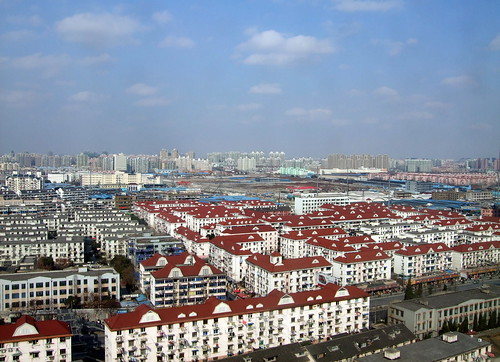Have we sacrificed too much to the suburban dream ?
Posted by Big Gav in transition towns
The SMH has an article on the transition town movement and its relevance to Sydney - We've already sacrificed too much to the suburban dream .
The recent trend of Transition Towns, as a response to climate change and the energy crisis, highlights the importance of recognising the rural context when considering the issues of urban development
The movement, which began in the town of Totnes, in Devon aims to reduce reliance on global sources of energy and food by sourcing needs from within a locality.
This is particularly relevant to the growth of Australian cities, as the continued spread of suburbia at the expense of proximate farming land is precisely the opposite of a climate responsive urban growth pattern.
Under our current economic model, food production, packaging and distribution contribute to more than 20 per cent of our energy use. With most of the cost of food taken up by packaging and distribution it is easy to see how rising food prices, an inevitable consequence of peak oil, could be alleviated by localising and intensifying food production. This is the "Transition Town" notion of decoupling food from oil.
Less generally understood perhaps, is how much damage has already been done by the suburban agglomeration. Not only has it destroyed farmland, coastline and other non-urban habitat, but its form and pattern is such that it can never be economically serviced by any type of circulation infrastructure: water, energy, waste or most obviously transport. An energy efficient city cannot be so dispersed and the continued release of land for housing subdivision on the fringe of major Australian cities, while politically attractive, will always be an environmentally irresponsible strategy.
Not surprisingly, the need to effectively implement the delivery of much higher density mixed use development into suburbia goes hand in hand with a more climate responsive approach to the non-urban environment. It is unlikely that suburban residents would see it that way, yet maintaining a compost heap down the end of the garden can hardly compensate for the massive environmental footprint that suburban living entails. Of course, residents have little choice because what passes for urban consolidation is really just suburban intensification, offering nothing in the way of a real urban experience and retaining all of the negative features of suburbia.
Surely the real benefit of urban consolidation should be the opportunity to avoid the homogenised sameness of suburbia while being close to non-urban places.
Despite good intentions, it is probably not enough to simply introduce higher densities to the suburbs. The suburbs themselves may need to be transformed. If the transition towards much higher densities at transport nodes was accompanied by a corresponding transition to much lower densities in the surrounding undifferentiated suburban fabric, the suburbs could be ultimately dismantled to be reconstituted as non-urban space. Under this scenario, a major metropolitan area such as Sydney would be recast as an efficiently linked network of maybe a hundred small high-density cities occupying one-tenth of the current urban footprint, with the featureless interstitial suburban fabric going under the plough. Like Transition Towns, suitable land would then be available locally for fresh food production, or for other non-urban uses such as forest, parkland, waste recycling, aquaculture and power generation.






